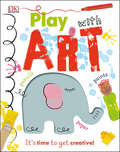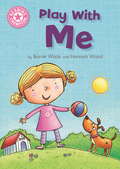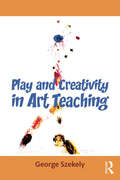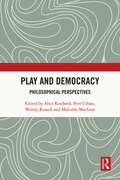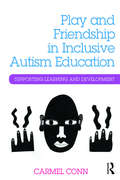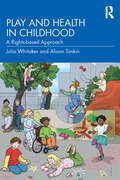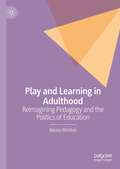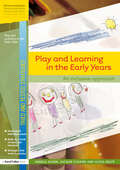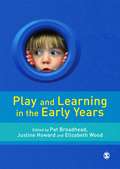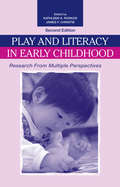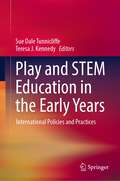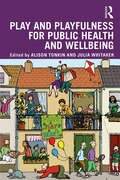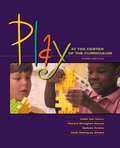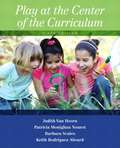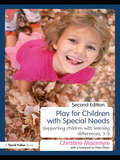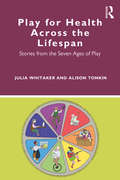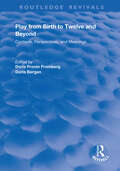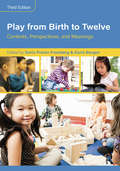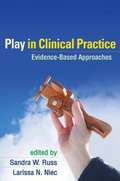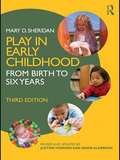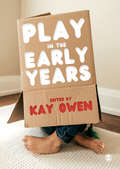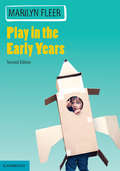- Table View
- List View
Play With Art
by DKWith more than 40 fun ideas to try out, this book is the perfect starting point for little ones who want to discover all types of art.A child will love getting to grips with the basics of painting (using non-toxic food-safe paint), print making, drawing, paper crafting, and more.For each different creative media, there are 6+ easy projects to try - so you don't have to keep putting things away and getting out something new! All the projects feed a child's imagination and encourage creative play. From vegetable printing, to making shadow puppets and a unicorn hobbyhorse, Play with Art is packed with exciting ideas for a little learner starting on their art journey.
Play With Me: Independent Reading Pink 1A (Reading Champion #27)
by Dr Barrie WadeReading Champion offers independent reading books for children to practise and reinforce their developing reading skills.Fantastic, original stories are accompanied by engaging artwork and a reading activity. Each book has been carefully graded so that it can be matched to a child's reading ability, encouraging reading for pleasure.Independent Reading Pink 1A stories are perfect for children aged 4+ who are reading at book band 1A (Pink) in classroom reading lessons.In this story, everyone is too busy to play... perhaps Dog can come to the rescue!
Play and Creativity in Art Teaching
by George SzekelyIn Play and Creativity in Art Teaching, esteemed art educator George Szekely draws on his two classic volumes, Encouraging Creativity in Art Lessons and From Play to Art, to create a new book for new times. The central premise is that art teachers are not only a source of knowledge about art but also a catalyst for creating conditions that encourage students to use their own ideas for making art. By observing children at play and using props and situations familiar to them, teachers can build on children’s energy and self-initiated discoveries to inspire school art that comes from the child’s imagination. The foundation of this teaching approach is the belief that the essential goal of art teaching is to inspire children to behave like artists, that art comes from within themselves and not from the art teacher. Play and Creativity in Art Teaching offers plans for the study of children’s play and for discovering creative art teaching as a way to bring play into the art room. While it does not offer a teaching formula or a single set of techniques to be followed, it demystifies art and shows how teachers can help children find art in familiar and ordinary places, accessible to everyone. This book also speaks to parents and the important roles they can play in supporting school art programs and nourishing the creativity of their children.
Play and Democracy: Philosophical Perspectives
by Wendy Russell Malcolm MacLean Petr Urban Alice KoubováThis book explores the complex and multi-layered relationships between democracy and play, presenting important new theoretical and empirical research. It builds new paradigmatic bridges between philosophical enquiry and fields of application across the arts, political activism, children’s play, education and political science. Play and Democracy addresses four principal themes. Firstly, it explores how the relationship between play and democracy can be conceptualized and how it is mirrored in questions of normativity, ethics and political power. Secondly, it examines different aspects of play in urban spaces, such as activism, aesthetic experience, happenings, political carnivals and performances. Thirdly, it offers examples and analyses of how playful artistic performances can offer democratic resistance to dominant power. And finally, it considers the paradoxes of play in both developing democratic sensibilities and resisting power in education. These themes are explored and interrogated in chapters covering topics such as aesthetic practice, pedagogy, diverse forms of activism, and urban experience, where play and playfulness become arenas in which to create the possibility of democratic practice and change. Adding extra depth to our understanding of the significance of play as a political, cultural and social power, this book is fascinating reading for any serious student or researcher with an interest in play, philosophy, politics, sociology, arts, sport or education.
Play and Friendship in Inclusive Autism Education: Supporting learning and development
by Carmel ConnTaking an innovative approach to autism and play, this practical text focuses on the particular form play and friendship takes for children with autism and their peers. Autistic children have clear preferences for play, with sensory-perceptual experience remaining a strong feature as they develop. Play and Friendship in Inclusive Autism Education offers a framework for supporting children’s development through play, with step-by-step guidance on how to facilitate the playful engagement of children with autism. Up to date research findings and relevant theoretical ideas are presented in an accessible and practical way, highlighting what theory means to ordinary practice in schools, whilst focusing on practical knowledge in autism education. Split into five chapters, this book covers some of the main issues surrounding inclusive education and play: discourses and definitions of play the difference between play and playfulness autism, play and the inclusion agenda in education the nature of sensory-perceptual experience in children’s play cultures effective ways of supporting children’s friendships. With practical guidance on how to support children with autism through play, this book will be essential reading for teachers, learning support assistants, SENCos and play workers, as well as professionals working in an advisory capacity. Students studying courses that cover autism will also find Play and Friendship in Inclusive Autism Education a valuable resource.
Play and Health in Childhood: A Rights-based Approach
by Alison Tonkin Julia WhitakerTaking a rights-based approach to the interdependence of play and health in childhood, this text argues that the child’s right to health and development cannot be satisfied without also the fulfillment of their right to play. Underpinned by theory and real-life ‘case stories’ drawn from practice and family life, Whitaker and Tonkin present what is known about the benefits of play and its potential to address the pressing health needs in the short and long terms of the youngest generation. They define and discuss the concepts of childhood, play, health, and human rights before exploring how play interacts with the four fundamental principles of the UN Convention on the Rights of the Child: non-discrimination; best interests; life, survival, and development; and inclusion and participation. The book then investigates how practitioners can advocate for the child’s right to play to meet all their health and development needs. It presents numerous examples of best practice from a range of settings – including hospitals, schools, community initiatives, charities, families, and more – and incorporates the voices of children as they imagine a future in which play is elevated to a central position in their lives, allowing for the achievement of lifelong health and happiness. Exploring children’s rights from a practical perspective, this accessible book is essential reading for students and practitioners in healthcare, social work, community work, early years, and education.
Play and Learning in Adulthood: Reimagining Pedagogy and the Politics of Education
by Nicola WhittonThis book provides a theoretical and philosophical examination of games, play and playfulness and their relationships to learning and wellbeing in adulthood. It draws on an interdisciplinary literature base (including game-based learning, game studies, education, psychology, and game design) to present a critical manifesto for playful learning in post-compulsory education and lifelong learning. While there is an established body of work in games and learning in adulthood, and a wide literature on the value of play in childhood, the wider potential of play in adulthood and playfulness is under-explored and still emergent. This book offers a comprehensive overview of play in adulthood, exploring the benefits and drawbacks, examining why play in adulthood is different from play in childhood, the role of play in culture, and making an argument for why it is important in our society that we embrace the principles of playfulness.
Play and Learning in the Early Years: An Inclusive Approach (Tried And Tested Strategies Ser.)
by Angela GlennPlay is crucial to every child's development. Use these practical strategies to ensure all children benefit from learning through play. Includes: Short case studies that illustrate how strategies work in practice Practical, topical information on how to include all children in day-to-day activities Explanation of how different types of SEN can affect a child's play Advice on how to address different behaviours seen during play Photocopiable resources Written for practitioners in all pre-school settings, as well as students, parents and childminders.
Play and Learning in the Early Years: From Research to Practice
by Pat Broadhead Justine Howard Elizabeth WoodProviding high quality play experiences is an essential part of good early years education, but this can pose a challenge for practitioners who face pressure from a more didactic primary curriculum, and from parents worried that their children will fail to acquire essential skills and knowledge. By helping the reader to develop their understanding of the complex relationships between play and learning, this book examines current theoretical perspectives on play, alongside examples of recent and innovative play research from a range of disciplinary and methodological perspectives. With contributions from leading play scholars, it brings together theory, research, policy and practice in relation to play and learning in early years settings. The emphasis is on the relationship between play and learning, and play and pedagogy, and the need to understand these dimensions more substantially in order to teach with confidence. Included are chapters on: - the influence of play on thinking, problem-solving and creativity - cooperative play and learning - play, risk and outdoor learning - learning to play in cultural context There are chapter objectives, reflective points, reflective tasks and suggestions for further reading throughout, to facilitate critical thinking and encourage independent study. Suitable for early years practitioners, early childhood students at undergraduate and postgraduate levels, and all those who work with and care for young children, this is an exciting and thought-provoking book.
Play and Literacy in Early Childhood: Research From Multiple Perspectives
by Kathleen A. Roskos James F. ChristieThis volume brings together studies, research syntheses, and critical commentaries that examine play-literacy relationships from cognitive, ecological, and cultural perspectives. The cognitive view focuses on mental processes that appear to link play and literacy activities; the ecological stance examines opportunities to engage in literacy-related play in specific environments; and the social-cultural position stresses the interface between the literacy and play cultures of home, community, and the school. Examining play from these diverse perspectives provides a multidimensional view that deepens understanding and opens up new avenues for research and educational practice. Each set of chapters is followed by a critical review by a distinguished play scholar. These commentaries' focus is to hold research on play and literacy up to scrutiny in terms of scientific significance, methodology, and utility for practice. A Foreword by Margaret Meek situates these studies in the context of current trends in literacy learning and instruction. Earlier studies on the role of play in early literacy acquisition provided considerable information about the types of reading and writing activities that children engage in during play and how this literacy play is affected by variables such as props, peers, and adults. However, they did not deal extensively, as this book does, with the functional significance of play in the literacy development of individual children. This volume pushes the study of play and literacy into new areas. It is indispensable reading for researchers and graduate students in the fields of early childhood education and early literacy development.
Play and Practice in the Early Years Foundation Stage
by Ms Natalie CanningPlay is an underlying theme of the Early Years Foundation Stage (EYFS) but it is often a challenge for practitioners to provide a play based curriculum. This book investigates the values and beliefs that underpin play and demonstrates through case studies how play opportunities can be observed, planned and assessed in a meaningful context for the child. Organized into four sections that mirror the EYFS, this book takes you through the curriculum framework demonstrating how play underpins each of these principles and is the common thread that links them together. Chapters include: - celebrating children's play choices - ways to work with parents - inspiring environments for inspirational play - the role of play in supporting key relationships - creative play for flexible learning Incorporating the voices of Early Years practitioners, this book takes the unique approach of analysing the academic theory, showing how this can be put into practice and then suggesting activities to facilitate reflective practice and professional development. Useful to all those studying on any Early Years course, the book is particularly relevant to those leading practice in early years settings and those working towards Early Years Professional Status (EYPS).
Play and STEM Education in the Early Years: International Policies and Practices
by Sue Dale Tunnicliffe Teresa J. KennedyThis edited book provides an overview of unstructured and structured play scenarios crucial to developing young children’s awareness, interest, and ability to learn Science, Technology, Engineering and Mathematics (STEM) in informal and formal education environments. The key elements for developing future STEM capital, enabling children to use their intuitive critical thinking and problem-solving abilities, and promoting active citizenship and a scientifically literate workforce, begins in the early years as children learn through play, employing trial and error, and often investigating on their own.Forty-seven STEM experts come together from 16 countries (Argentina, Australia, Belgium, Canada, England, Finland, Germany, Israel, Jamaica, Japan, Malta, Mauritius, Mexico, Russia, Sweden, and the USA) and describe educational policies and experiences related to young learners 3–4 years of age, as well as students attending formal-nursery school, early primary school, and the early years classes post 5 years of age.The book is intended for parents seeking to provide STEM activities for their children at home and in playgroups, citizen scientists seeking guidance to provide children with quality educational activities, daycare practitioners providing educational structures for young children from birth to formal education, primary school teachers and preservice teachers seeking to teach preschool, kindergarten or children typically aged 5–8 years old in grades 1–3, as well as researchers and policy makers working in science didactics with small children.
Play and playfulness for public health and wellbeing
by Alison Tonkin Julia WhitakerThe role of play in human and animal development is well established, and its educational and therapeutic value is widely supported in the literature. This innovative book extends the play debate by assembling and examining the many pieces of the play puzzle from the perspective of public health. It tackles the dual aspects of art and science which inform both play theory and public health policy, and advocates for a ‘playful’ pursuit of public health, through the integration of evidence from parallel scientific and creative endeavors. Drawing on international research evidence, the book addresses some of the major public health concerns of the 21st century – obesity, inactivity, loneliness and mental health – advocating for creative solutions to social disparities in health and wellbeing. From attachment at the start of life to detachment at life’s ending, in the home and in the workplace, and across virtual and physical environments, play is presented as vital to the creation of a new ‘culture of health’. This book represents a valuable resource for students, academics, practitioners and policy-makers across a range of fields of interest including play, health, the creative arts and digital and environmental design.
Play at the Center of the Curriculum
by Judith Van Hoorn Patricia Monighan Nourot Barbara Scales Keith Rodriquez AlwardThis book for future early childhood educators offers all of the background needed to plan and implement a developmentally appropriate, play-centered curriculum for children ages 3 to 8.
Play at the Center of the Curriculum
by Judith Van Hoorn Patricia Monighan Nourot Barbara Scales Keith Rodriguez AlwardThe leading text in the field, Play at the Center of the Curriculum seamlessly combines the features of a text on play and development with the features of an early childhood curriculum text to present a comprehensive, cogent rationale for placing play at the center of a balanced curriculum. Ideal for those who want to engage children in a developmental zone where children and teachers are learning from and with each other, the authors put play at the center of a balanced curriculum that includes spontaneous, guided, and directed play as well as teacher planned instruction. They describe how knowledgeable teachers use a wide repertoire of strategies to orchestrate the flow from spontaneous play to guided play, to more subject oriented instruction, and back to play. This thoroughly updated Sixth Edition interweaves anecdotes of children’s play, theories of play and development, empirical evidence from research, and practical instructional strategies to give students a clear look at play and the curriculum.
Play for Children with Special Needs: Supporting children with learning differences, 3-9
by Christine MacintyreThere are many more children with learning differences and difficulties in our schools today. Their needs are varied and complex and professionals must find appropriate ways to enhance their learning. The value of play is endorsed in policy initiatives including The Early Years Foundation Stage curriculum, so professionals can be reassured that ‘more time to play’ is in line with the latest thinking. Christine Macintyre emphasises the importance of creating an environment where children become confident, independent learners, increasingly able to use their imaginations, care for others and to take safe risks. This fully revised edition of Play for Children with Special Needs includes new research findings and explains their implications for practice. This book then enables those supporting children to: understand the benefits of play and how to adapt different scenarios to support children who do not find it easy to play observe children as they play so that any difficulties can be identified early analyse different play areas so that the different kinds of learning (intellectual, creative, motor, social and emotional) are appreciated. Play for Children with Special Needs, 2nd edition enables practitioners to appreciate the contribution that play makes to the education of all children, whether they have special needs or not. It is for parents, teachers, teaching assistants and nursery professionals as well as those who care for children at home.
Play for Health Across the Lifespan: Stories from the Seven Ages of Play
by Alison Tonkin Julia WhitakerPlay for Health Across the Lifespan uses case studies to explore the impact of play and creativity on health and wellbeing throughout the lifecycle. While play at the start of life influences future development, the authors show play also has a role in improving prospects for health and wellbeing in adulthood and later life. A relational approach to health and wellbeing emphasizes the dynamic, mutually influential relationship between individual development and the changing contexts of our lives. Our personal play history is one feature of this dynamic process, and this book explores how the experience of play throughout the life course sculpts and resculpts the shape of our lives: our physical health, our mental wellbeing, and our relationship to the people and the world around us. Storytelling has been used since the beginning of time to communicate important life lessons in an engaging way. Taking inspiration from Shakespeare’s ‘Seven Ages of Man’, the book uses a case-story approach to differentiate the stages of development and to present evidence for how play and playful experiences impact on health and wellbeing from birth to the end of life in the context of temporal and situational change. Each chapter in Play for Health Across the Lifespan introduces relevant evidence-based research on play and health, before presenting several narrative ‘case stories’, which illustrate the application of play theory and the neuroscience of play as they relate to each life stage. With contributions from specialists in health and education, community organizations and the creative and performing arts, this book will appeal to academics, students, and practitioners who are interested in exploring the role of play in addressing contemporary challenges to our physical, mental, and social health.
Play from Birth to Twelve: Contexts, Perspectives, and Meanings
by Doris Pronin FrombergFirst published in 1998. Play is pervasive, infusing human activity throughout the life span. In particular, it serves to characterize childhood, the period from birth to age twelve. Within the past twenty years, many additions to the knowledge base on childhood play have been published in popular and scholarly literature. This book assembles and integrates this information, discusses disparate and diverse components, highlights the underlying dynamic processes of play, and provides a forum from which new questions may emerge and new methods of inquiry may develop. The place of new technologies and the future of play in the context of contemporary society also are discussed.
Play from Birth to Twelve: Contexts, Perspectives, and Meanings
by Doris Pronin Fromberg and Doris BergenIn light of recent standards-based and testing movements, the issue of play in child development has taken on increased meaning for educational professionals and social scientists. This third edition of Play From Birth to Twelve offers comprehensive coverage of what we now know about play and its guiding principles, dynamics, and importance in early learning. These up-to-date essays, written by some of the most distinguished experts in the field, help educators, psychologists, anthropologists, parents, health service personnel, and students explore a variety of theoretical and practical ideas, such as: all aspects of play, including historical and diverse perspectives as well as new approaches not yet covered in the literature how teachers in various classroom situations set up and guide play to facilitate learning how play is affected by societal violence, media reportage, technological innovations, and other contemporary issues play and imagination within the current scope of educational policies, childrearing methods, educational variations, cultural differences, and intellectual diversity New chapters in the third edition of Play From Birth to Twelve cover current and projected future developments in the field of play, such as executive function, neuroscience, autism, play in museums, "small world" play, global issues, media, and technology. The book also suggests ways to support children’s play across different environments at home, in communities, and within various institutional settings.
Play in Clinical Practice
by Sandra Russ Larissa NiecGoing beyond traditional play therapy, this innovative book presents a range of evidence-based assessment and intervention approaches that incorporate play as a key element. It is grounded in the latest knowledge about the importance of play in child development. Leading experts describe effective strategies for addressing a wide variety of clinical concerns, including behavioral difficulties, anxiety, parent child relationship issues, trauma, and autism. The empirical support for each approach is summarized and clinical techniques are illustrated. The book also discusses school-based prevention programs that utilize play to support children's learning and social-emotional functioning.
Play in Early Childhood: From Birth to Six Years
by Justine Howard Mary Sheridan Dawn AldersonBased on the pioneering work of Mary D. Sheridan, Play in Early Childhood is a classic introductory text to play and development - key topics for all those who work with young children. Updated for a contemporary audience and fully evidence-based, it explains how children's play develops and how they develop as they play. With over eighty illustrations and observations of play from birth to six years, this new edition presents classical and contemporary literature, making clear links between play and all areas of children's development. It includes activities to consolidate thinking and suggestions for further reading throughout. Play in Early Childhood considers: the development, value and characteristics of play issues relating to culture, adversity and gender play from recreational, therapeutic and educational perspectives the role of parents/caregivers and professionals in supporting play Suitable for those new to the area or for more experienced workers wanting a quick reference guide, this easy-to-follow book meets the needs of students and professionals from a wide range of health, education and social care backgrounds, including early years professionals, playworkers, children's nurses, speech and language therapists and social workers.
Play in the Early Years
by Kay OwenPlay in the Early Years provides an accessible overview of key concepts, debates and approaches to children’s Play. This book: · Considers play from a variety of perspectives · Offers expert insights into theory and research in each area · Encourages the reader to critically reflect on both theory and practice With features including key terms, case studies, reflective questions, spotlights on research and an accompanying glossary, this text is perfect for everyone who is interested in Play - from those just starting undergraduate degrees through to those with more advanced knowledge or experience.
Play in the Early Years
by Kay OwenPlay in the Early Years provides an accessible overview of key concepts, debates and approaches to children’s Play. This book: · Considers play from a variety of perspectives · Offers expert insights into theory and research in each area · Encourages the reader to critically reflect on both theory and practice With features including key terms, case studies, reflective questions, spotlights on research and an accompanying glossary, this text is perfect for everyone who is interested in Play - from those just starting undergraduate degrees through to those with more advanced knowledge or experience.
Play in the Early Years
by Marilyn FleerThe Early Years Learning Framework is a key component of the Australian Government's National Quality Framework for early childhood education and care. Play-based learning is an important focus in both the Framework and in early childhood education degrees at Australian universities. Play in the Early Years is a comprehensive study of pedagogy and play in early childhood education by a globally recognised leader in the field. Marilyn Fleer examines how play has been thought about across time, culture and institutions, including in childcare, family day care, schools and community groups. The book presents and analyses the latest research and theories about early childhood pedagogy and play. Vignettes and real-world examples help students connect theory to practice, while end-of-chapter glossaries help to consolidate understanding of key concepts and ideas. This is an accessible and engaging textbook that will be an invaluable resource for practitioners and undergraduate students of early childhood education.
Play in the Early Years
by Marilyn FleerThe Early Years Learning Framework is a key component of the Australian Government's National Quality Framework for early childhood education and care. Play-based learning is an important focus in both the Framework and in early childhood education degrees at Australian universities. Play in the Early Years is a comprehensive study of pedagogy and play in early childhood education by a globally recognised leader in the field. Marilyn Fleer examines how play has been thought about across time, culture and institutions, including in childcare, family day care, schools and community groups. The book presents and analyses the latest research and theories about early childhood pedagogy and play. Vignettes and real-world examples help students connect theory to practice, while end-of-chapter glossaries help to consolidate understanding of key concepts and ideas. This is an accessible and engaging textbook that will be an invaluable resource for practitioners and undergraduate students of early childhood education.
